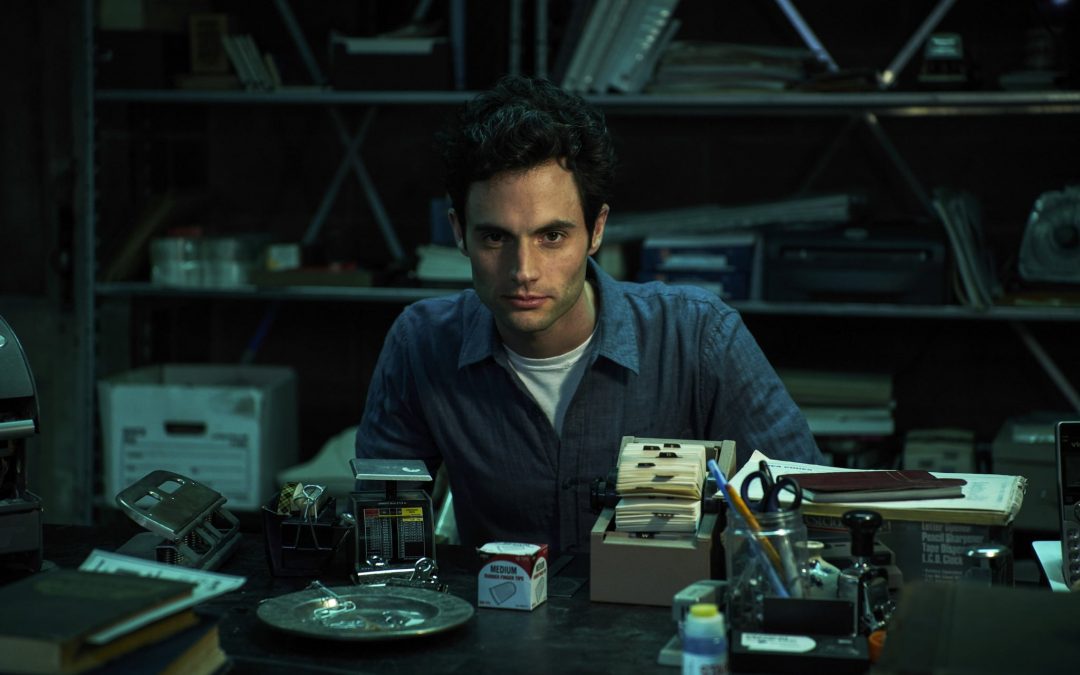Contains major spoilers for season one of You
One of the hottest new shows on Netflix is You, a glossy, highly addictive thriller which sees Penn Badgley play Joe, a bookstore manager who’s also an expert stalker. Joe uses his internet nous (and psychopathic tendencies) to manipulate the girl he fancies, Beck (Elizabeth Lail) into dating him. It’s based on a novel by Caroline Kepnes and a second season has already been announced.
You is a twisty psychological chiller that plays with perceptions of who the heroes and villains are, and comes with plenty of moral dilemmas. We really enjoyed the show, and its ethical complexities, and to be clear, we are quite aware that by the series’ conclusion the characters have, um, bigger fish to fry than the below. You is not a realistic, issue-led drama…
But there’s one moment in episode two that is worth a bit more of an exploration in the era #MeToo.
Major spoilers for You season one episode two: Kidnapped By Danger to follow.
In Kidnapped By Danger there’s a bigger problem than just that terrible title.
In the ep, aspiring poet Beck, who’s working to make ends meet as a teaching assistant at the university where she studies, gets into a sticky situation with her sleazy professor, Paul Leahy (Reg Rogers). The Prof invites Beck out for a drink to discuss literature, convincing her he’s not trying to hit on her since he’s married. But once in the bar he gets all handsy and when Beck objects he basically blames her and threatens to take her job away.
Beck leaves in distress but when she tells potential love interest/crazy murderous stalker Joe about what happened he encourages her to take control of the situation.
We then see Beck confront Professor Leahy, telling him she has six other women prepared to go on record to say that he’d pulled a similar move with them and that he must transfer her to a different tutor or she’ll expose him. Later we see Beck has joined a different study group.
In the era of #MeToo this is a bit of a problem.
If we believe Beck genuinely has found six other women who’ve been sexually harassed by Leahy who’ve bravely agreed to stand together to expose him as the creep he is, it’s totally NOT OK for Beck to use that to blackmail Leahy into getting her transfer and keeping her job.
What is Beck going to say to the other six? ‘Stand down everyone, I’ve got a new tutor, we’re all good!’
If Leahy really is that much of a serial sex pest (and it’s safe to assume he is because even if Beck was bluffing and hadn’t really spoken to six women, if Leahy had only ever behaved that way with Beck – and we are not for a second saying that makes it OK – then surely he would have called her out on the lie?) – then surely him getting exposed for the a-hole he is would be far more important than her getting a transfer.
If she’s really persuaded six other women to stand strong and make a firm allegation against Leahy, it’s a massive betrayal of them for her to then promise their silence in exchange for something that benefits only her. Even if it was something that benefitted all six (which it isn’t) that is still missing the point of #MeToo, leaving a man who is a serial offender still in office in a position of authority and therefore able to prey on other students.
Put more succinctly: Leahy has definitely harassed at least seven women. Beck knows it. But rather than report it and hopefully get Leahy fired and prevent other women from having the same experience, she just transfers to another tutor.
Part of the reason #MeToo came about was because it was often very difficult for women who’d experienced sexual harassment or worse to be believed. Only when women banded together, supported each other, talked openly and shared their experiences did real tangible change seem possible.
To be clear, we’re definitely not saying that victims have an ethical obligation to always report their attackers, especially when it might mean considerable pain, exposure, professional and personal disadvantage and a very real risk of not being believed. But Beck makes the point that there are six others who have said they ARE willing to go on the record, who she seems to be throwing under the bus. And the moral issue with that is never even raised.
OK, so You isn’t meant to be gritty reality. Suspension of disbelief is pretty much a must (seriously, who doesn’t have a password on their phone or laptop in this day and age? Also, all the murders…), and it’s possible the audience is meant to think that Beck is far from a heroine and just as morally grey as Joe.
But given this blackmail plot line occurs in episode two, is treated like a victory, and that no one ever really mentions the fact that this a potentially dodgy move on Beck’s part, it feels like a bit of a #MeToo fluff.
And no, this isn’t our main takeaway from the show. But still…
You season one is available on Netflix now.

